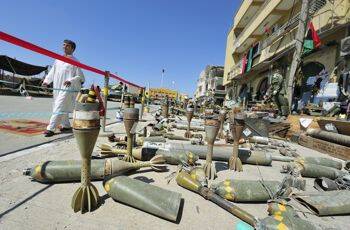The flow of illicit arms across international borders would be stemmed more effectively by addressing the demand for such weapons through education and public awareness programs, the Vatican's U.N. nuncio said. Addressing the U.N. Conference on the Arms Trade Treaty on July 27, Archbishop Francis Chullikatt said such efforts would promote a culture of peace while opposing a "culture of criminality and violence."
"The treaty must establish mechanisms to curtail irresponsible and destabilizing arms transfers," the archbishop said, explaining that illicit arms transfers fuel or perpetuate conflict, lead to weapons being used against civilians and violate U.N. resolutions.
"A true culture of peace requires that the ATT addresses both the supply and the demand side of arms trade, through close cooperation between states, in responsible partnership with the arms industry and in committed solidarity with civil society," he said. The conference ended July 27 with no agreement after a month of discussions on how to best regulate the $60-billion-a-year arms industry and prevent arms getting into the hands of political insurgents and criminal gangs that threaten innocent lives.
Secretary-General Ban Ki-moon described the lack of an agreement as "a setback." Archbishop Chullikatt called on the individual countries, international and nongovernment organizations and the private sector to end the illicit trade of arms of all types, from heavy armaments to small arms.
He added that the treaty should move beyond the regulation of conventional arms trading and reining in the international illicit markets by placing human dignity at its center. In line with that perspective, he called for the treaty to include provisions that cover assistance for victims of armed conflict in the form of health care, rehabilitation and social and economic reintegration.
The debate on the treaty, he explained gave the world the opportunity to "point out once again the pernicious impact of the illicit arms trade on development, peace, humanitarian law and human rights."
"Arms cannot simply be compared with other goods exchanged in global or domestic markets. They need a specialized regulation, one capable of preventing, combating and eradicating the irresponsible and illicit trade of conventional arms and related items," he said.
He said a strong and effective treaty "could represent a meaningful sign of the political will of nations and governments to ensure peace, justice, stability and prosperity in the world."








